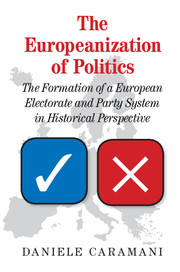 The Europeanization of Politics
The Europeanization of Politics from Part II - Analysis
Published online by Cambridge University Press: 05 November 2015
Introduction
The chapters so far have analyzed processes of cross-country convergence that the literature seen in Chapter 1 mostly traces back to within- and trans-country processes. This chapter introduces aspects that may be ranged under “top-down” effects, namely factors located at the supra-national level that affect countries in a similar way and thus create convergence. At the same time this chapter extends Chapter 6. While including an analysis of long-term trends since 1945, it focuses on Europeanization in the more usual definition of the impact of European integration on member-states. The hypothesis about the impact on cross-country convergence is addressed in an explanatory perspective. Beyond this impact, however, this chapter addresses further supra-national factors such as the breakdown of communist regimes in 1989 and the impact of such a momentous juncture on cross-country convergence.
Furthermore, while this book has so far focussed on the Europeanization of electorates and party systems, this chapter turns to the arena of cabinet and coalition politics. The move to the executive arena is needed first and foremost because the top-down effect from supra-national factors such as European integration is felt primarily in cabinets’ format and policy. It is at the level of cabinets and governmental coalitions that one observes programmatic changes that affect policy making. While small, extreme protest opposition parties are not called to translate their platforms into actual policies, programmes of parties with cabinet responsibility provide the basis for executive action.
Indeed, it is the programmatic action of cabinets that has been most affected by Europe-wide changes such as the end of the Cold War and European integration. On one hand, the breakdown of communist regimes in Central and Eastern Europe had the effect of de-radicalizing leftist politics and reducing the alternatives in foreign and economic policy. This has led to claims about the policy convergence through liberalizations and privatizations, as well as calls for a reduction of the welfare state and of general state intervention in the economy. On the other hand, the acceleration of the process of European integration since the Single European Act of 1986 and the Maastricht Treaty of 1992 has constrained the margin for action on the part of national governments.
To save this book to your Kindle, first ensure [email protected] is added to your Approved Personal Document E-mail List under your Personal Document Settings on the Manage Your Content and Devices page of your Amazon account. Then enter the ‘name’ part of your Kindle email address below. Find out more about saving to your Kindle.
Note you can select to save to either the @free.kindle.com or @kindle.com variations. ‘@free.kindle.com’ emails are free but can only be saved to your device when it is connected to wi-fi. ‘@kindle.com’ emails can be delivered even when you are not connected to wi-fi, but note that service fees apply.
Find out more about the Kindle Personal Document Service.
To save content items to your account, please confirm that you agree to abide by our usage policies. If this is the first time you use this feature, you will be asked to authorise Cambridge Core to connect with your account. Find out more about saving content to Dropbox.
To save content items to your account, please confirm that you agree to abide by our usage policies. If this is the first time you use this feature, you will be asked to authorise Cambridge Core to connect with your account. Find out more about saving content to Google Drive.